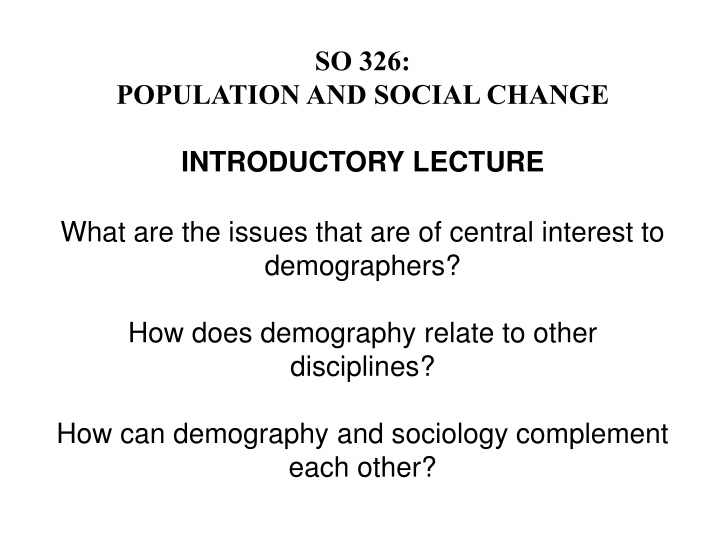
Demography and Its Interdisciplinary Connections
Explore the central interests of demographers, the relationship between demography and other disciplines, and how sociology complements demography. Discover the interdisciplinary nature of demography and population studies, and factors relevant to demographic explanation.
Download Presentation

Please find below an Image/Link to download the presentation.
The content on the website is provided AS IS for your information and personal use only. It may not be sold, licensed, or shared on other websites without obtaining consent from the author. If you encounter any issues during the download, it is possible that the publisher has removed the file from their server.
You are allowed to download the files provided on this website for personal or commercial use, subject to the condition that they are used lawfully. All files are the property of their respective owners.
The content on the website is provided AS IS for your information and personal use only. It may not be sold, licensed, or shared on other websites without obtaining consent from the author.
E N D
Presentation Transcript
SO 326: POPULATION AND SOCIAL CHANGE INTRODUCTORY LECTURE What are the issues that are of central interest to demographers? How does demography relate to other disciplines? How can demography and sociology complement each other?
Population change In-migration Birth Death Out-migration
Household change Separation
Nuptiality/marriage (cohabitation) Separation/ Divorce Family/household structure Sexual behaviour/ family planning Population growth/decline Fertility/births Migration Mortality/death Age structure
What does sociology offer to demography? Data (censuses, surveys, vital registration, life history data) Qualitative data Explanation Demographic trends Methods (rates, life tables, standardisation Sociological theories
The Interdisciplinary Nature of Demography/Population Studies Sociology History Women s/Gender Studies Social Policy Family/marital therapy Geography Psychology Demography/ Population Studies Planning/ Urban studies Epidemiology (& genetics) Actuarial science Medicine Economics Development/ Third World Social Statistics Law
Factors relevant to demographic explanation: (e.g. with respect to (future) fertility among the formerly married ) Demographic (e.g. sex ratios) Spatial Cultural (e.g. social norms) Economic (e.g. poverty) Technological (e.g. contraception) Legal (e.g. divorce laws) Psychological Political/ideological etc., etc.


